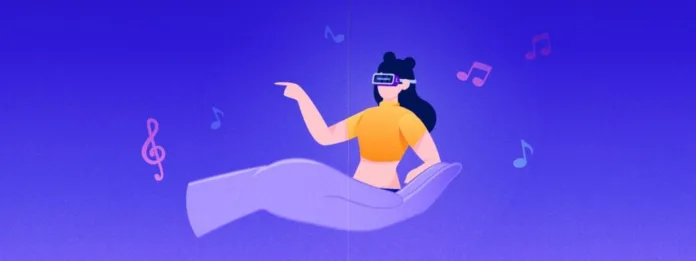
The future of the music industry is evolving faster than ever, and one of the most disruptive forces leading this change is Metaverse live music. As the digital world expands, the way we experience sound, performance, and connection is undergoing a revolutionary shift. From virtual reality (VR) stages to holographic performances, the Metaverse is redefining how artists perform and how fans attend concerts.
In this article, we explore how the Metaverse is influencing the future of live music, the technology behind it, and what this transformation means for the music industry and audiences worldwide.
🎧 What is the Metaverse?
The Metaverse refers to a persistent, shared digital space that combines virtual reality (VR), augmented reality (AR), and blockchain technologies to create immersive user experiences. Think of it as the next evolution of the internet—an interactive, 3D universe where users can socialize, work, play, and now, even attend live music performances.
Platforms like Roblox, Fortnite, and Meta’s Horizon Worlds are already hosting virtual concerts, where millions of fans can gather simultaneously from anywhere in the world.
🎤 Why Metaverse Live Music is Gaining Momentum
1. Accessibility and Global Reach
One of the biggest challenges with traditional concerts is location and cost. Not every fan can attend live shows due to travel expenses, limited venue capacity, or health restrictions. Metaverse live music breaks down these barriers by offering immersive experiences accessible from any device with an internet connection.
A fan in India can now attend a Snoop Dogg concert happening virtually in the U.S.—no passport, no visa, just VR gear or a smartphone.
2. Limitless Creative Possibilities
In the physical world, concerts are restricted by gravity, budget, and logistics. But in the Metaverse, the stage is limitless. Artists can perform on floating islands, underwater arenas, or even in outer space. The creative freedom offered by virtual platforms opens doors to new kinds of storytelling and audience engagement never before imagined.
3. Economic Opportunities
Virtual concerts are not just innovative; they’re also profitable. Artists can sell digital merchandise (NFTs), virtual tickets, and exclusive access passes to fans. This creates new income streams and reduces reliance on physical tours.
Major artists like Travis Scott and Ariana Grande have already demonstrated this with multi-million-dollar performances inside virtual environments.
🧩 The Technology Behind Virtual Concerts
Bringing live music to the Metaverse requires an ecosystem of advanced technology. Here’s what powers these events:
Virtual Reality (VR): Offers immersive experiences where fans can feel as if they’re right next to their favorite artist.
Augmented Reality (AR): Blends virtual elements with the real world, enhancing live performances with dynamic visuals.
Motion Capture & Avatars: Artists wear suits that track body movement and facial expressions to animate their digital avatars in real time.
Spatial Audio: Simulates 3D sound so that the audio experience adapts based on your position within the virtual venue.
Blockchain & NFTs: Provide proof of ownership for digital merchandise and tickets, enabling secure and transparent fan engagement.
These tools ensure that VR music events are not just digital imitations but fully immersive experiences.
📈 How Artists and Fans Benefit
For Artists:
Reach a global audience instantly
Lower costs for touring and stage setup
More creative freedom with performance style
New revenue streams via digital sales and NFTs
For Fans:
Affordable access to premium experiences
No travel or safety concerns
Interactive environments and personalized music experiences
Collectible digital souvenirs and exclusive content
🔮 Challenges and the Road Ahead
Despite its promise, Metaverse live music is not without challenges. These include:
Technology Accessibility: High-quality VR headsets are still costly for the average consumer.
Data Privacy: Concerns over user data, identity, and tracking within virtual platforms.
Copyright Issues: Licensing music in virtual spaces can be complex due to new rules and digital rights.
However, as hardware becomes more affordable and platforms mature, these obstacles are expected to diminish. Major record labels, tech firms, and startups are investing heavily in building sustainable models for music in the Metaverse.
🌍 Real-World Examples of Metaverse Concerts
Several high-profile events have already showcased the potential of live music technology in digital worlds:
Travis Scott in Fortnite: Drew over 27 million viewers to a surreal, animated show.
Ariana Grande’s Rift Tour: Combined gameplay and music into a dreamlike concert journey.
Snoop Dogg in The Sandbox: Used NFTs and avatars to create an interactive hip-hop metaverse party.
These events are proof that Metaverse concerts aren’t just a concept—they’re a rapidly growing trend in entertainment.
🛠 What’s Next for Music in the Metaverse?
The future looks promising. Innovations like haptic feedback (which lets fans “feel” the bass) and AI-generated performances could make virtual concerts even more engaging. Entire VR music festivals could become the norm, with attendees exploring stages across different digital universes.
Imagine watching your favorite band from a floating balcony above a virtual lake while fireworks sync perfectly with the beat—this is the direction the industry is heading.
🎵 Final Thoughts
Metaverse live music is not just a buzzword—it’s a powerful trend that’s reshaping how we think about performance, connection, and entertainment. As technology evolves and digital adoption increases, we’re entering an age where geography, venue capacity, and even physical limitations are no longer relevant to the concert experience.
For artists, it’s a new stage. For fans, it’s a new front row. And for the music industry, it’s the dawn of a new era.